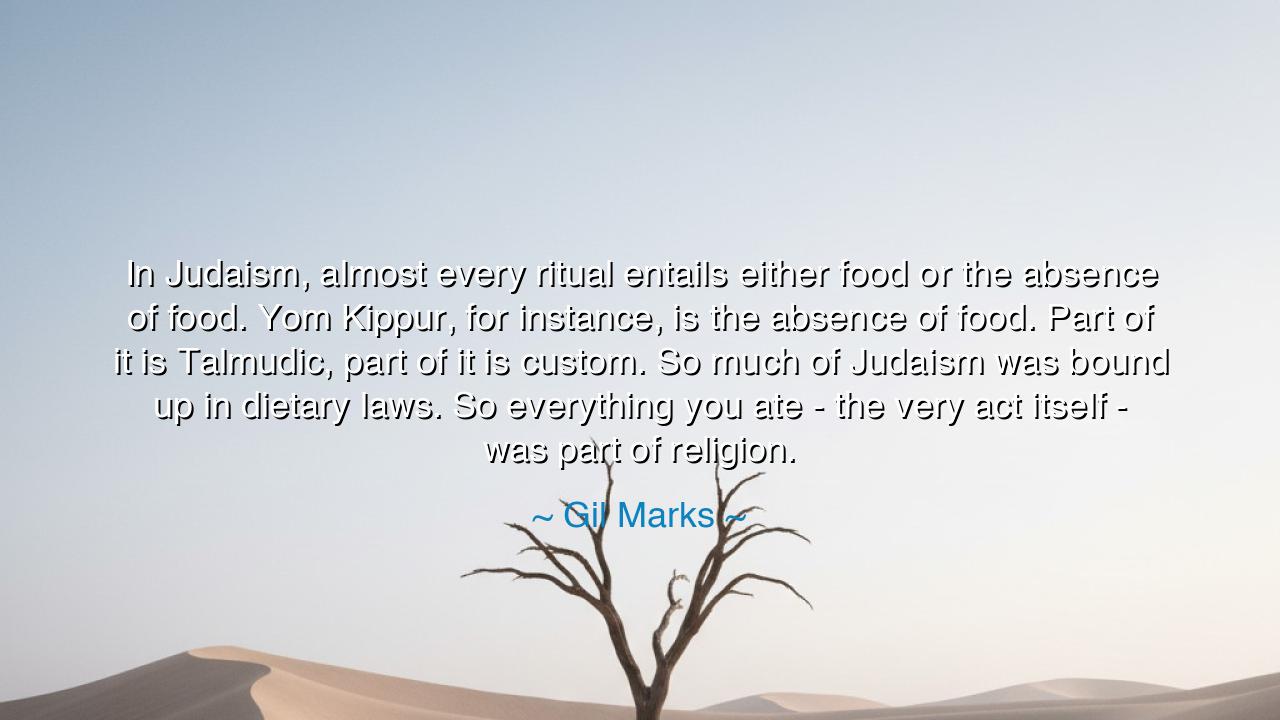
In Judaism, almost every ritual entails either food or the
In Judaism, almost every ritual entails either food or the absence of food. Yom Kippur, for instance, is the absence of food. Part of it is Talmudic, part of it is custom. So much of Judaism was bound up in dietary laws. So everything you ate - the very act itself - was part of religion.






In the quiet wisdom of his scholarship, Gil Marks, a historian, chef, and rabbi, once said: “In Judaism, almost every ritual entails either food or the absence of food. Yom Kippur, for instance, is the absence of food. Part of it is Talmudic, part of it is custom. So much of Judaism was bound up in dietary laws. So everything you ate — the very act itself — was part of religion.” These words reveal not only the sacred bond between faith and nourishment, but also the profound idea that holiness is found in the simplest of human acts. In Judaism, as Marks teaches, eating itself becomes prayer, and restraint becomes remembrance. Through this, the ordinary rhythm of sustenance is transformed into a spiritual discipline — a way of living consciously, gratefully, and reverently.
The origin of this insight lies deep within Jewish tradition, where law (halakha) and life are inseparable. From the ancient writings of the Talmud to the customs shaped by centuries of diaspora, food has always served as a language of devotion. The act of eating — choosing what to eat, how to prepare it, when to eat, and when to refrain — forms a living dialogue between the human and the divine. The command to observe kashrut, or the dietary laws, was never meant as mere restriction. It was a way to remind the faithful that every bite comes with awareness — that life itself is sacred, and that gratitude must accompany consumption.
Consider the example of Yom Kippur, the Day of Atonement, when Jews across the world fast from sunset to sunset. This is the absence of food — not as punishment, but as purification. In this sacred hunger, one learns what it means to depend on more than bread alone. The body grows weak so that the spirit may grow strong. The mind quiets, the heart humbles, and in that silence, the soul listens. As Marks says, fasting is not an act apart from life, but part of the same sacred cycle as feasting. To eat with reverence and to abstain with purpose — these are two faces of the same devotion.
The ancient rabbis understood that rituals involving food were not merely physical customs but acts of mindfulness. When one blesses the bread (hamotzi) or the wine (kiddush), it is not the food that becomes holy — it is the eater who awakens to holiness. The simple act of eating transforms into a meditation on creation itself: the rain that nourished the grain, the sun that ripened it, the hands that harvested it. In every blessing lies a recognition of life’s fragile interdependence. Thus, to eat is not to consume, but to participate in the divine order of being.
Throughout Jewish history, food has also been the vessel of memory and identity. When the Israelites fled Egypt, they baked unleavened bread, and every year the matzah on Passover recalls that haste and hope. When the oil in the Temple miraculously burned for eight days, the frying of latkes keeps that light alive. Each meal is a story, each flavor a remembrance. Gil Marks, both scholar and chef, saw this truth clearly — that Judaism sanctifies not only the synagogue and the scroll, but also the table and the kitchen. Through the rhythm of eating and fasting, celebrating and abstaining, life itself becomes a tapestry of worship.
This teaching offers a powerful lesson for all people, regardless of faith: that awareness transforms the ordinary into the sacred. The act of eating — so often rushed, mindless, or indulgent — can instead become a moment of gratitude. To pause before a meal, to honor its origins, to eat without greed — these are spiritual acts. Likewise, choosing sometimes to abstain, to fast or simplify, awakens compassion for those who hunger daily. When we eat with mindfulness and humility, we remember that sustenance is not a right, but a gift.
And so, my children, let this be your teaching: honor life through the small rituals of living. Bless your food, and bless the hands that bring it to your table. Eat not only for pleasure, but for purpose. Fast, sometimes, to remember your dependence and renew your gratitude. For as Gil Marks so wisely said, in Judaism — and indeed in all of life — the sacred dwells in what we take in and in what we refuse. When you live this way, even the simplest act of breaking bread becomes a prayer, and every meal, whether in feast or fast, becomes a doorway to the divine.






AAdministratorAdministrator
Welcome, honored guests. Please leave a comment, we will respond soon